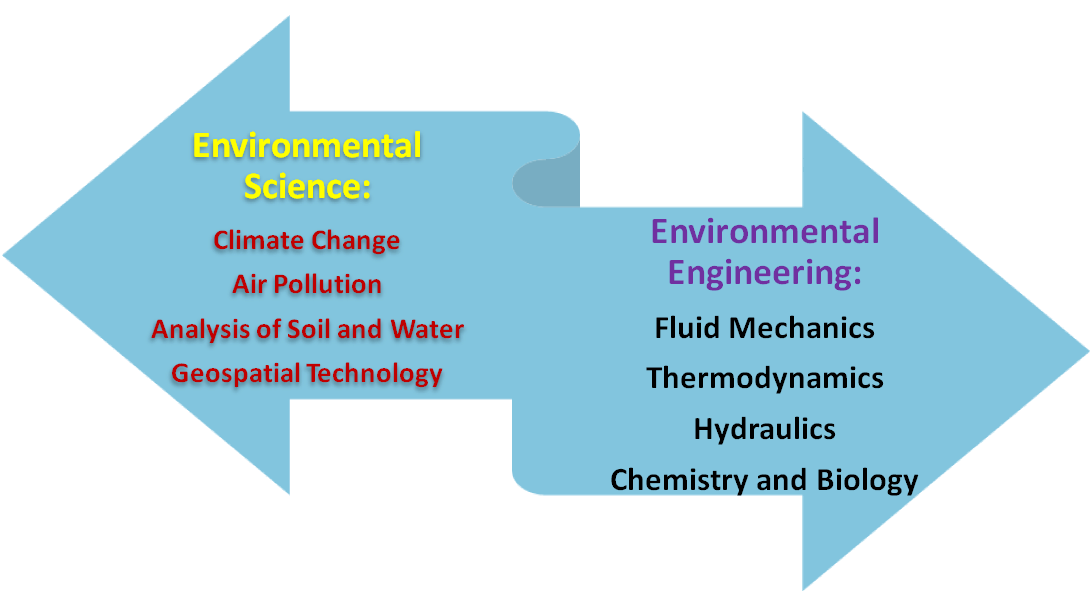They both address environmental issues. However, there are differences in their approach to improving and remediating the effects on the habitat. The environmental scientist takes an analytical perspective. He/she focuses on what caused the particular condition, whereas the engineer looks at how to correct the problem. For example, the scientist looks at the cause and results of water contamination. The engineer takes the scientist’s information and determines what needs to be done to remove the contaminants.
Environmental scientists explore climate change, air pollution, water quality, soil contamination, hazardous materials affecting humans and animals. They venture into a variety of areas that affect the earth’s resources. As scientists, they collect drinking water or atmospheric samples for analysis in a laboratory. They provide the results, which they convey to engineers, the court of law, local community, or governmental agencies.
Environmental engineers’ responsibilities overlap with their counterparts. Engineers are also involved in soil and water contamination, air pollution, and wastewater treatment. Their knowledge finds solutions for these adverse environmental issues. Using engineering principles, they determine the means to clean up water, design sewage treatment plants, and reduce factory emissions.
Individuals contemplating one of the captioned degrees should ask themselves two questions. One, do you relish trying to figure out what caused something to happen? On the other hand, do you prefer to ponder the best way to fix the problem? The work of the scientist can be tedious as you perform lab tests and make sense of the results. The engineer’s role takes into account the disciplines of fluid mechanics, hydrology, construction, and thermodynamics (a branch of physics).
There is a long list of accredited schools offering degrees in environmental science. You can select from the prestigious (and expensive) universities, such as Harvard, Yale, and the Massachusetts Institute of Technology (MIT). You can attend on campus or online learning format.
Regardless of the learning institution, a Bachelor of Science is the starting point for both professions. In environmental science, there are choices in where to concentrate your studies. You may choose natural resources and conservation that addresses the preservation of natural resources, as well as the remediation of hazards. Geospatial technology is another choice. You will learn about geographic information systems or GIS and remote image analysis. GIS is a computer-generated imagery system used to locate water sources, vegetation, pollution sites, and other environmental applications. It acts as an aid in sustainability too.
Be prepared for a curriculum loaded with science and math courses in any B.S. in Environmental Science. Some of the classes you can expect are biology, chemistry, toxicology, molecular ecology, tropical ecology, earth dynamics, and hydrogeology. Electives and alternative subjects study climate change, environmental policies, anthropology, population ethics, and general physics. Math classes entail linear algebra, calculus, and quantitative modeling.
Some of the classes in a Bachelor of Science in Environmental Engineering are the same. For example, you will likely study chemistry and biology. These subjects give you a foundation in the analysis of contaminants. Typically, the engineering program differs in coursework concerning the mechanics of fluids, hydraulics, thermodynamics, and hydrodynamics. Similar to environmental science, you will have a dose of mathematics, namely algebra, differential equations, analytical geometry, and calculus.
Despite the emphasis on science courses in each major, some environmental science programs offer a reduced concentration. A degree in sustainability, for example, highlights the policies, laws, and applications pertinent to sustainability. Your career is less oriented to field work and more to the management of resources. In this type of program, your study plan includes economics, business ethics, urban ecology, and environmental law.
Employment
Your bachelor’s degree in environmental science takes you into private and government work. Scientists work for county and city sanitation and public services departments, as well as the EPA. In this position, you direct and supervise personnel involved in the respective department. For example, activities in water and sewer treatment, solid waste management, and hazardous materials assessment.
A review of posted jobs in environmental services, the preferred education mentions both of the captioned degrees. Additionally, a partial list of the minimum qualifications extends to a degree in civil engineering, biology, chemistry, geology or geosciences.
Salary Consideration
The U.S. Bureau of Labor Statistics (BLS) reports the occupation of Environmental Scientists and Specialists at $69,400 (May 2017) with a Bachelor’s degree. The projected job growth is 11%, which is above average. The increase should result in a change of 9,900 jobs through 2026.
When considering potential salary, there is a difference between the two degrees. The BLS states that Environmental Engineers earn a median pay of $86,800 with an undergraduate diploma. The Bureau predicts its job growth at 8%, or average, through 2026. Fewer jobs will change, only 4,500.
Additional Resources
What degree do I need to become an Environmental Engineer?
How Advanced Does My Degree in Environmental Engineering Need to Be to Get a Good Job?
What Master’s Degrees Should I Consider If I Want to Help the Environment?
What are the 5 Best Careers in Environmental Science?
The Top 10 “Green” Careers for Nature-Lovers
30 Great Outdoor Jobs Requiring a College Degree


